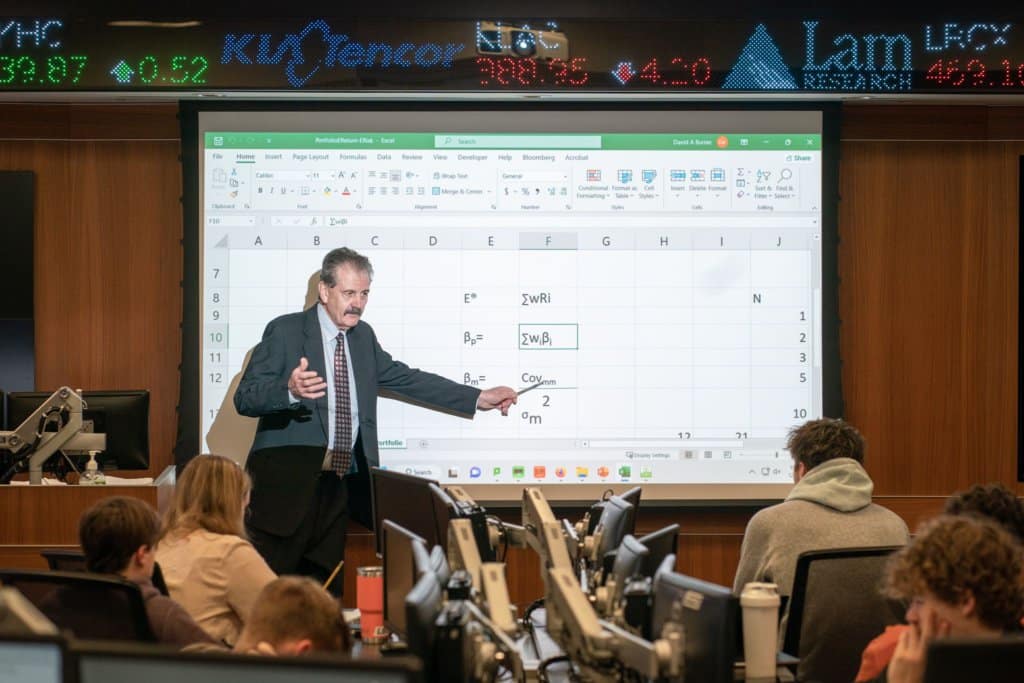To future-proof your career, choose a qualification that is just as versatile as it is lucrative — like the Master of Science (M.S.) in Finance from Western Michigan University’s Haworth College of Business. This programme was designed to accelerate careers in not just the timeless fields of finance, asset management, investment banking, and corporate financial planning but also computational finance, securities, risk analysis and several other 21st-century sectors.
The best part? With an undergraduate business degree, preparation only requires one year of study, making this accelerated, 30-credit-hour programme an apt choice for those keen on quickly impressing employers and securing the leadership role they want. Those with more specific career goals in mind will be happy to know that there are three specialisations to choose from: corporate financial planning and analysis, securities and markets or data analytics in finance.
One of the three will be paired with a strategically curated line-up of required courses. The basics are covered in the Financial Management course, which teaches the proper use of quantitative methods. “It leverages Harvard Business Review case studies to illustrate contemporary finance practice,” explains Dr. David Burnie, professor of finance and head of the M.S. in Finance programme.
“This course introduces the Bloomberg Terminal and selected Microsoft Excel financial modelling add-ins to expand analysis of real-world business scenarios. For example, one case explores how a Monte Carlo simulation provides insight into the trade-off theory of capital structure. Another case explores an initial public offer for the company Snap, with financial modelling to establish the theoretical value of Snap Inc.”

Dr. David Burnie’s research covers the valuation of debt securities, IPOs, mergers and acquisitions, rights, options, dividend re-investment plans, repurchases and more. Source: Western Michigan University
Meanwhile, the Global Financial Markets and Institutions course covers contemporary issues in money, capital and foreign exchange markets, multinational financial management, financial instruments and intermediaries in a global context. The Corporate Financial Restructuring course teaches students about quantitative analysis and evaluation of the financial aspects of various corporate restructuring strategies such as bankruptcy reorganisation, divestitures, leveraged buyouts, spin-offs, break-ups, and mergers and acquisitions.
The rest of the programme comprises structured topics in Financial Strategy, Financial Operations, Financial Econometrics and Forecasting, Financial Modelling, Equity Analysis, Fixed Income Analysis, Derivatives and Risk Management, and Financial Data Analytics.
“The courses in the programme are designed to focus on particular aspects of finance rather than each course attempting to cover finance from a broad perspective,” says Dr. Burnie. “They build upon each other and provide students with compound knowledge of financial applications and practices.”
Industry insights are included throughout the programme, as is access to state-of-the-art facilities designed to give students a competitive edge. For example, M.S. in Finance courses are taught in the Greenleaf Trust Trading Room, which emulates a Wall Street trading environment. Here, students are taught to use the Bloomberg Terminal to research market movements in real time and immerse themselves in the same technology used by investment professionals. In the Sanford Centre for Financial Planning and Wellness, students make use of resources and programming related to both financial literacy and personal financial planning.

The M.S. in Finance is STEM designated, meaning it can provide international students up to 24 additional months of occupational training in the US. Source: Western Michigan University
Students are given access to databases such as Compustat, Centre for Research in Security Prices, and ExecuComp — all of which are available through Wharton Research Data Services. They will also be able to explore Refinitiv sources for merger and acquisition data.
These and more were set in place to ensure M.S. in Finance graduates enter or re-enter the working world confidently. “Our students will be prepared for jobs in corporate finance, investment banking and a variety of areas within businesses and consulting firms requiring financial data management and analysis,” says Dr. Burnie.
The professor regularly skims through job postings online to source good fits for his students. Recently, he has come across several listed by big names. Crédit Agricole CIB was looking for a Leverage Finance Associate. Stryker Corporation needed a Finance Specialist, and Eaton Corporation was hiring for a Lead Pricing Analyst.
Dr. Burnie also found that JP Morgan’s Public Finance group was looking for an Associate to join its Debt Capital Markets team. Applicants need a background in municipal finance, municipal banking, or financial advisory — all of which M.S. in Finance students gain a firm foundation in during their Fixed Income Analysis course.
In fact, all finance-related postings reiterated the great demand for quantitative skills this M.S. in Finance provides — a competency valuable to both domestic and international students. Since this dynamic programme is STEM designated, it can provide international students up to 24 additional months of occupational training in the US.
So what are you waiting for? Earn a versatile qualification and increase your earning potential at the Haworth College of Business today. Click here to apply.
Follow Western Michigan University on Facebook, Instagram, Twitter, and YouTube.












